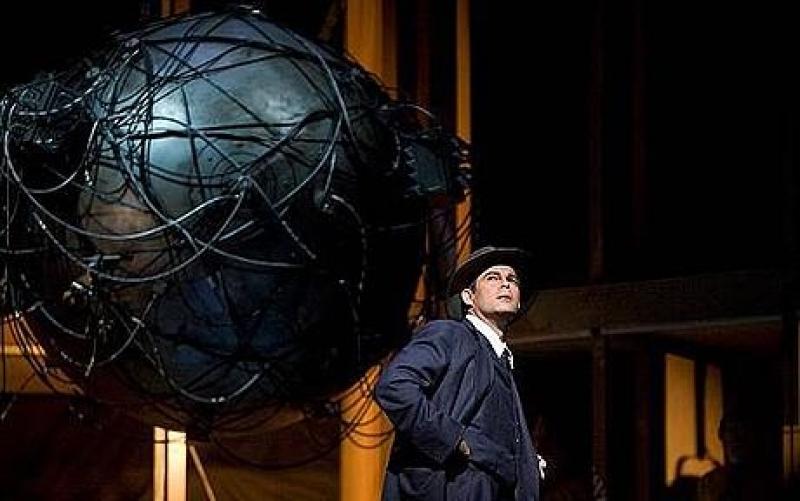Doctor Atomic, ENO | reviews, news & interviews
Doctor Atomic, ENO
Doctor Atomic, ENO
Heart-battering from Finley and company in Adams' A-bomb opera

Among the most astonishing moments in John Adams's new opera Doctor Atomic (currently running at the English National Opera) is an aria at the end of the first act. The eponymous brains behind the Manhattan Project, Dr J. Robert Oppenheimer, stands alone on stage with his new creation, a spherical A-bomb coated in wires and tubes like a patient in intensive care, and sings John Donne's holy sonnet "Batter my heart, three-person'd God".
I say sings. It's really more of an explosion of anguish, rage and self-loathing, spat out with desperation, Gerald Finley superbly transforming this self-contained, supremely confident man of science into a wreck.
Doctor Atomic is a class act. It works in the manner of an oratorio or cantata, weaving philosophical ideas, intellectual arguments and psychological outbursts around a simple framework, the build-up of tension at the Los Alamos scientific compound as it prepares for the first atomic tests. Julian Crouch's sets impressively stack the declamatory chorus of scientists like they were saints in a medieval fresco. Underneath them, director Penny Woolcock allows the intense mundanity of daily life to play itself out simply, realistically, as the leading pack of scientists and army personnel slowly buckle under the strain of it all.
Characters are finely etched: Brindley Sherratt's sarcastic physicist Edward Teller, Thomas Glenn's whinny physicist Robert Wilson, Jonathan Veira's self-obsessed General Groves. The love story between Oppenheimer and his wife Kitty (Sasha Cooke in fine voice) is less successful, harbouring some crazily awful lines - "my eyes splitting the skull to tickle your brain with love". And there's still too much of Pasqualita, Kitty's hefty American Indian serving girl, and her Mystic Meg visions. But at least Adams knows it; he trimmed her part down since the opera was performed in Chicago two years ago. Conductor Lawrence Renes delivers a polished performance of what is one of Adams's finest scores to date.
The future of Arts Journalism
You can stop theartsdesk.com closing!
We urgently need financing to survive. Our fundraising drive has thus far raised £49,000 but we need to reach £100,000 or we will be forced to close. Please contribute here: https://gofund.me/c3f6033d
And if you can forward this information to anyone who might assist, we’d be grateful.

Subscribe to theartsdesk.com
Thank you for continuing to read our work on theartsdesk.com. For unlimited access to every article in its entirety, including our archive of more than 15,000 pieces, we're asking for £5 per month or £40 per year. We feel it's a very good deal, and hope you do too.
To take a subscription now simply click here.
And if you're looking for that extra gift for a friend or family member, why not treat them to a theartsdesk.com gift subscription?

Add comment